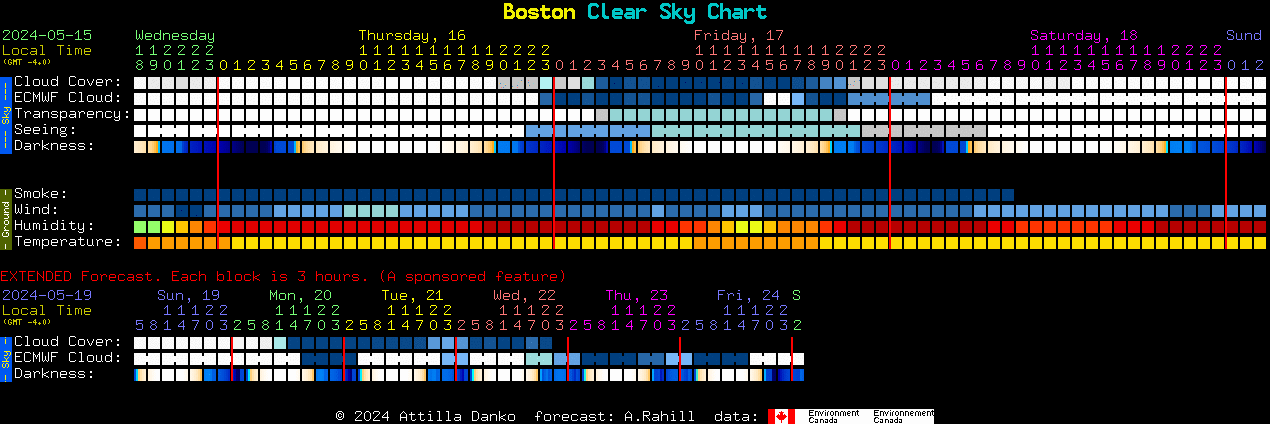Arlington
Astronomy Nights '25
at Robbins Farm
Park
Join us on the listed Saturday evenings for Astronomy Nights at Robbins Farm
Park!
Each night we'll have at least one telescope out to view objects in
the night sky. Like last year, the best planets for viewing aren't up
until close to the fall (the outer planets move slowly relative to our
years, so they're still close to where they were last year)
but we'll still have plenty to look at. Since last year every single
Astronomy Night was rained out, this year I'll plan some repeats with
themes, and hopefully we'll get at least some, if not all, of them in.
The events are totally informal and fun for all ages. Weather permitting,
the dates are as follows:
- June 21st (8:30pm): Mars has been slowly crossing the sky the last few
months and this is our chance to see it before it is gone for the year.
While we won't be able to see a lot of detail since it is pretty far from us
at the moment, we'll see its shape and color and how it is different from
seeing a star in the sky. This summer is pretty limited for planets, so we'll
take what we can get! Depending on how late we go, the moonless sky will allow
for viewing some deep sky objects.
- July 12th (9:15pm): A moonless sky lets us take a look for some of the
fainter objects way outside our solar system. We'll find double stars, star
clusters, and depending on the conditions, maybe even a nebula or two. Light
pollution is a major factor here, but we'll do our best. The Moon rises after
an hour or so, a nice view over Boston!
- August 2nd (8:00pm): The Moon is a little over half full (a waxing, gibbous
phase) and will make a great sight in any telescope or binoculars. We'll look
at the lunar mare (mah-ray) that were once thought to be seas of water,
and we'll see craters that are lit edge-on by the Sun's light. The shadows
cast by the edges of the craters help us to see the depth and structure of
what otherwise might look flat.
- Sept 13th (8:45pm): Canceled due to expected clouds
Even though it is getting dark substantially earlier by
this point in the year, we'll gather once Saturn has had a chance to come up
over Boston. Saturn will be almost as close to Earth as it ever gets so while
seeing it low to the horizon isn't ideal, we'll still be able to see its rings!
Stay tuned for perhaps another chance later in the fall when Saturn is a little
higher.
- October 18th (7:15pm):
We'll gather once Saturn has had a chance to come up
over Boston even though it will already be dark earlier. Saturn will be just a month past its
closest approach to Earth of the year, so while
seeing it low to the horizon isn't ideal, we'll still have a nice view!
We're also only about 7 months since we crossed the plane of Saturn's rings,
meaning we'll be seeing them almost edge-on. They should be faintly visible
as a line through the planet by now.
I'll be out probably until 9pm when the park closes -- the later you come, the higher up Saturn gets and the clearer
the image will be, but also the further past bedtime for younger ones.
Each Astronomy Night will generally start when the stars come out and usually lasts
a couple hours. To add the schedule to your own calendar, import the
ICS
file. If it is overcast we'll have to cancel and hope for
clear weather next time, but as long as there are some stars
visible we'll give it a shot. For reminders and weather decisions,
consider joining my announcement
mailing list. Weather decisions for questionable nights will
also be posted on this site.
We set up the telescopes on the observation area of Robbins
Farm Park that overlooks Boston.
Please note: it
will be dark in the park! Bring a flashlight, but please keep it
aimed at the ground while you're in the park. Parents, please help your
children remember this rule. It takes your eyes a while to adjust to the
dark, and you'll see more in the sky once your night vision is working.
Keeping your flashlight pointed at the ground helps everybody keep their
eyes adjusted to the dark. Red light doesn't hurt night vision as much so
a red flashlight or red cellophane over a flashlight helps a lot! Consider
using bug spray too.
If you have questions, feel free to contact me at jeff [at]
arlingtonastronomy [dot] org


